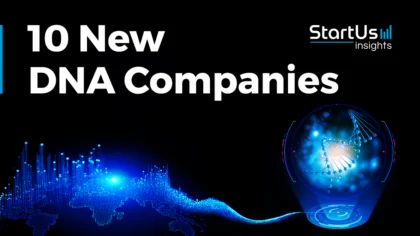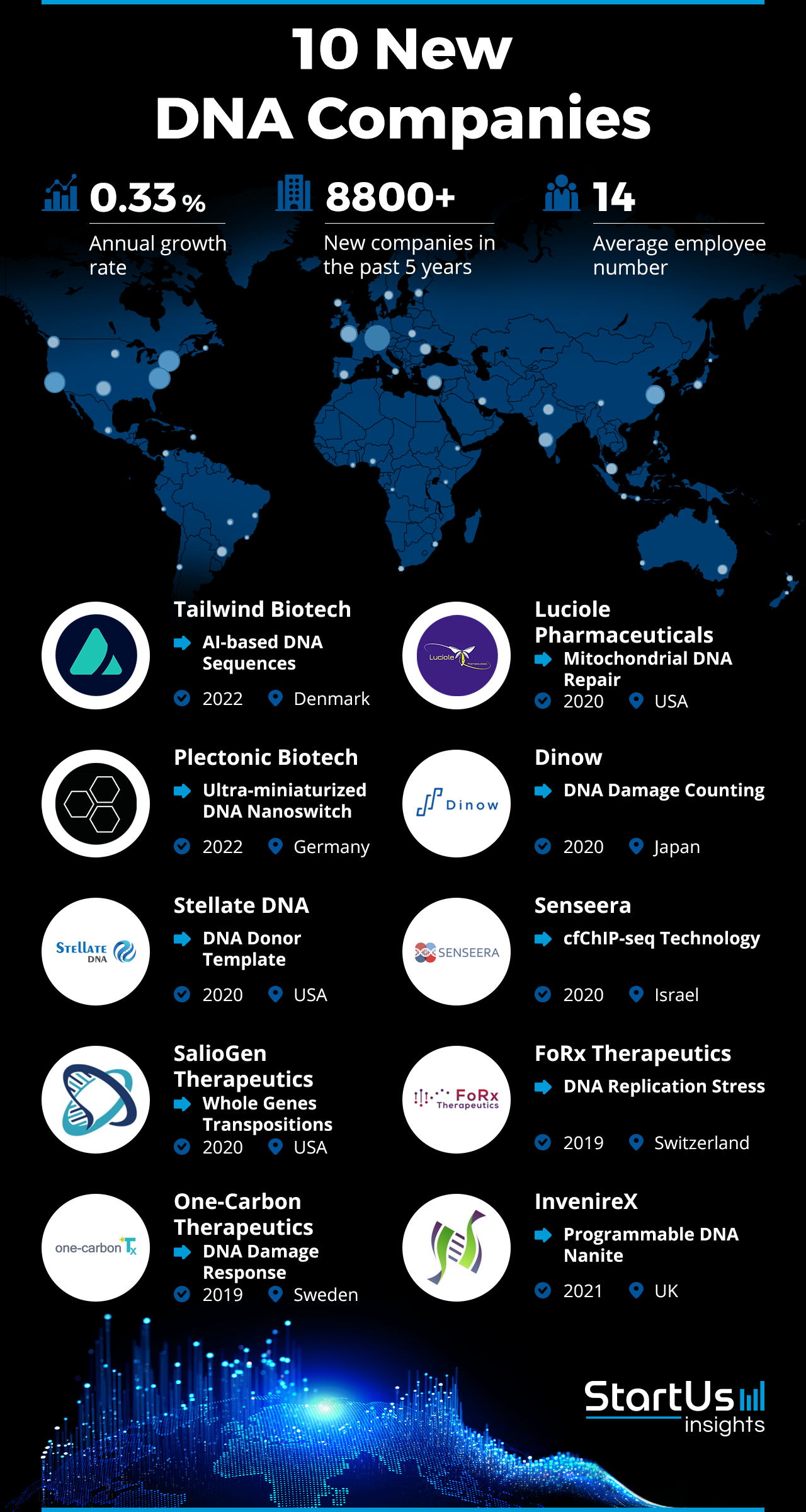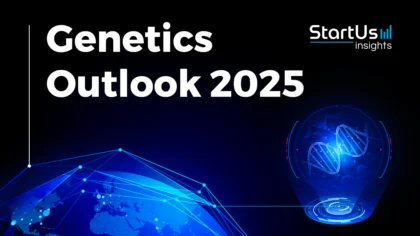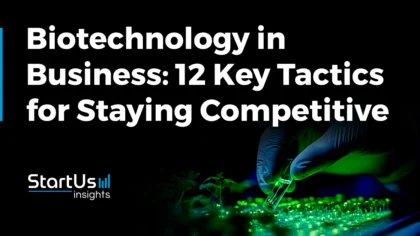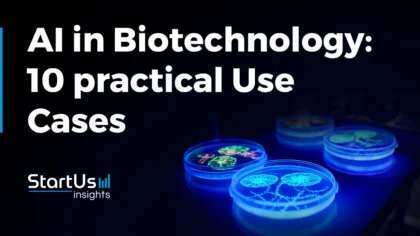This article details 10 new DNA companies that advance technologies such as clustered regularly interspaced short palindromic repeats (CRISPR)-Cas9, next-generation sequencing, and gene editing to upgrade genetic research and medicine. These innovations enable modifications to genetic material to offer cures for genetic disorders and improve understanding of complex diseases. These companies also work towards tackling typical industry challenges, including ethical concerns, off-target effects, and the accessibility of these technologies to broader populations.
Continue reading to gain up-to-date and data-driven insights on:
Key Takeaways
Drawing insights from the Big Data & AI-powered StartUs Insights Discovery Platform that provides data on over 4.7+ million emerging companies globally, we explore the evolving landscape of the DNA industry. This sector is marked by key trends and a substantial workforce, shaping its future. The last update of this report was 5 days ago. If you spot incomplete or incorrect info, please let us know. Here are some key insights at a glance:
- Latest DNA Trends: The current DNA trends include microfluidics, ribonucleic acid (RNA) sequencing, phenotyping, microarray, and pyrosequencing.
- DNA Industry Statistics: The global real estate industry encompasses 17.5K+ organizations and has a massive 1.8M workforce. It is experiencing 0.33% in annual growth rate and has seen the emergence of 8.8K+ new DNA companies in the past five years. Each of these companies employs about 14 people.
- 10 New DNA Companies to Watch:
- Tailwind Biotech – AI-based DNA Sequences
- Plectonic Biotech – Ultra-miniaturized DNA Nanoswitch
- Stellate DNA – DNA Donor Template
- SalioGen Therapeutics – Whole Genes Transpositions
- One-Carbon Therapeutics – DNA Damage Response
- Luciole Pharmaceuticals – Mitochondrial DNA Repair
- Dinow – DNA Damage Counting
- Senseera – cfChIP-seq Technology
- FoRx Therapeutics – DNA Replication Stress
- InvenireX – Programmable DNA Nanite
Discover 10 out of 8,8K+ Emerging DNA Companies
In this section, we highlight 10 new DNA startups that drive innovation in the biotech industry. These companies address complex genetic challenges and meet evolving healthcare demands. By leveraging advanced gene editing techniques, diagnostic tools, personalized medicine, and AI-driven technologies, these companies reshape the future of genetic research and medicine.
Note on Signal Strength
One of the unique metrics we feature for each company is Signal Strength, a proprietary data point generated by our Discovery Platform. It gauges the extent to which a company’s influence has permeated the global ecosystem of startups, scaleups, and emerging companies. This proprietary metric serves as a valuable guidepost for understanding a company’s standing in the broader market landscape.
1. Tailwind Biotech
- Founding Year: 2022
- Employee Range: 2-10
- Location: Denmark
- Signal Strength: Medium Strong
- What they do: Tailwind Biotech designs synthetic DNA using advanced AI. The company’s proprietary AI platform optimizes DNA sequences and enhances gene expression levels and maximizes bioproduction yields. In bioproduction applications, optimized DNA is introduced into host organisms, which then undergo fermentation to produce increased outputs of proteins, enzymes, and molecules. This process results in higher yields of essential end-products such as medicines, detergents, and chemicals. The technology eliminates trial-and-error approaches and enhances predictability while speeding up DNA design and bioproduction processes. Also, it increases control of biomanufacturing time and cost efficiency in protein production during fermentation or cultivation. The platform serves biotechnology, pharmaceuticals, chemicals, industrial enzymes, biofuels, food & beverages, and cosmetics & fragrances industries.
2. Plectonic Biotech
- Founding Year: 2022
- Employee Range: 11-50
- Location: Germany
- Signal Strength: Strong
- What they do: Plectonic Biotech utilizes DNA nanotechnology to combat cancer. The company’s LOGIBODY, an ultra-miniaturized nanoswitch crafted from DNA works for antibody immunotherapies. It specifically recognizes cancer cells, enhances the precision of T-cell engaging therapies, and reduces on-target off-tumor reactions. The increased specificity allows the immune system to target cancer cells accurately and minimizes adverse effects on healthy tissue. This nanoswitch also addresses the challenge of cancer cells not being identifiable by a single antigen. Thus, it assists in targeted cancer treatment with lower activity on healthy tissues.
3. Stellate DNA
- Founding Year: 2020
- Employee Range: 2-10
- Location: USA
- Signal Strength: Very Strong
- What they do: Stellate DNA develops the Stellate DNA Gatalyst platform, which manufactures single-stranded DNA donors for high-efficiency, low-toxicity gene editing. The platform supports homology-directed repair (HDR) based knock-ins of payloads up to 20 kb using the clustered regularly interspaced short palindromic repeats (CRISPR)-Cas9 system. The startup’s Gatalyst donor technology ensures customizable and high-quality templates for genome editing to enhance integration efficiency and minimize non-homologous interactions. The circular form of Stellate Gatalyst donors protects against degradation and offers a longer half-life and increased targeted integration. Stellate DNA’s Gatalyst CRISPR cell line modeling services enable large fragment excision or correct mutations in various cell lines. This platform assists in cell engineering, animal model generation, and therapeutic research sectors, advancing high-throughput gene editing.
4. SalioGen Therapeutics
- Founding Year: 2020
- Employee Range: 51-100
- Location: USA
- Signal Strength: Very Strong
- What they do: SalioGen Therapeutics uses gene coding technology, a non-viral method for integrating large or multiple whole genes into the genome at specific locations. The company utilizes the proprietary Saliogase enzyme to insert large DNA pieces (up to 100 kb) without double-strand breaks or guide RNA. The technology leverages mammal-derived bioengineered enzymes that target specific sequences within the human genome efficiently. Nanoparticle delivery systems enable access to various tissue and organ systems and expand genetic medicine applications. This approach allows for the inclusion of multiple genetic elements and enhances treatments for complex genetic diseases. The technology assists precise, tissue-specific integration and minimizes mutagenic and immunologic risks.
5. One-Carbon Therapeutics
- Founding Year: 2019
- Employee Range: 2-10
- Location: Sweden
- Signal Strength: Very Strong
- What they do: One-Carbon Therapeutics targets the DNA damage response (DDR) in cancer cells. The company focuses on the loss of growth control mechanisms to exploit DNA repair defects in cancer cells and the accumulation of unrepairable damage and subsequent death. Additionally, the startup integrates one-carbon metabolism pathways to regulate the nucleotide supply essential for DNA synthesis and repair. This approach heightens cancer cells’ sensitivity to nucleotide imbalances that cause DNA damage. The startup’s MTHFD1/2 inhibitors, targeting methylenetetrahydrofolate dehydrogenase 1 and 2, induce replication stress and death in cancer cells while sparing normal cells. These solutions treat cancers, inflammation, and autoimmune diseases by attacking the DDR.
6. Luciole Pharmaceuticals
- Founding Year: 2020
- Employee Range: 2-10
- Location: USA
- Signal Strength: Very Strong
- What they do: Luciole Pharmaceuticals develops small molecule activators of OGG1 to accelerate the repair of oxidative damage to mitochondrial DNA. These activators enhance OGG1, an enzyme in the base excision repair (BER) pathway, to address DNA damage and oxidative stress in cells. They prevent mitochondrial dysfunction and DNA damage-induced inflammation and offer potential treatments for age-related diseases. Additionally, Luciole Pharmaceutical targets neurodegenerative disorders like amyotrophic lateral sclerosis (ALS), Alzheimer’s, and Parkinson’s. The startup’s OGG1 also assists in metabolic diseases and prevents obesity and related complications.
7. Dinow
- Founding Year: 2020
- Employee Range: 2-10
- Location: Japan
- Signal Strength: Very Strong
- What they do: Dinow detects and analyzes DNA damage by utilizing the γ-H2AX assay to count DNA damages caused by radiation and everyday factors. It visualizes phosphorylated H2AX through fluorescent staining. This assay requires only a few milliliters of blood to estimate the effects of DNA damage on the body. The company’s Radiation Impact Assessment estimates radiation exposure and evaluates disease risk for radiation workers and disaster victims. The Repair Capacity Assessment measures an individual’s ability to repair DNA damage and understand personal resistance levels. Additionally, the Lifestyle Assessment quantifies the impact of daily habits on DNA damage. Dinow aims to refine these technologies to make DNA damage evaluation more accessible, supporting a new healthcare approach centered on DNA damage analysis.
8. Senseera
- Founding Year: 2020
- Employee Range: 11-50
- Location: Israel
- Signal Strength: Very Strong
- What they do: Senseera develops advanced liquid biopsy blood tests to provide information about disease processes within internal organs and the immune system. It utilizes chromatin immunoprecipitation (cfChIP)-seq technology to capture chromatin fragments in the blood, which carry rich epigenetic information. This test uses antibodies to enrich informative DNA fragments from active genome regions, followed by sequencing and sophisticated computational analysis. It detects signals from tissues and immune systems and diagnoses diseases like colorectal cancer and liver diseases. Moreover, the use of cfChIP-seq increases sensitivity and specificity in disease detection and reduces the costs of human health screening.
9. FoRx Therapeutics
- Founding Year: 2019
- Employee Range: 11-50
- Location: Switzerland
- Signal Strength: Very Strong
- What they do: FoRx Therapeutics develops compounds to target DNA replication stress for cancer treatment. The oncogene-induced DNA replication stress in cancer cells leads to stalling and collapse of DNA replication forks. This stress results in DNA breaks and genomic instability that drive cancer progression and therapy resistance. FoRx Therapeutics targets cancer cells’ heavy reliance on break-induced replication to repair collapsed forks by developing small molecule inhibitors. These inhibitors exploit synthetic lethality to selectively disrupt cancer cells’ essential repair pathways, sparing normal cells. By leveraging these genetic vulnerabilities, FoRx Therapeutics advances targeted anticancer therapies and offers more effective treatment options.
10. InvenireX
- Founding Year: 2021
- Employee Range: 2-10
- Location: UK
- Signal Strength: Strong
- What they do: Invenirex builds a platform, DetectX, that combines AI algorithms with programmable DNA nanite technology. The platform enables ultra-sensitive detection and quantification of individual molecules with precision and sensitivity. Its programmable DNA nanite technology targets any nucleic acid. Moreover, the DetectX system integrates a neural network to provide real-time results without the need for purification steps. This technology facilitates ultra-early disease detection, personalized medicine, molecular analysis, and environmental monitoring.
Quick Tip to Find New DNA Companies
Utilizing a SaaS platform like the Discovery Platform for identifying new DNA companies provides significant benefits compared to traditional scouting methods:
- Streamlined Efficiency: The Discovery Platform offers advanced tools that streamline the scouting process. It replaces hours of your conventional desk research, saving time and resources in identifying new DNA solutions.
- Access to Real-time Insights: Gain a competitive edge with up-to-date information on the latest trends in the DNA industry. The platform keeps you informed with near real-time updates on emerging DNA companies and news, enabling you to make swift and informed decisions.
- Tailored Exploration: Customize your search to focus on specific niches within the DNA sector, such as programmable DNA nanite, DNA replication stress, or cfChIP-seq technology. The platform’s diverse filtering options allow you to target your scouting efforts precisely, ensuring that you find the most relevant and groundbreaking companies in the field.
Ready to Explore All New DNA Companies?
We’ve explored the dynamic landscape of the DNA industry, examining the latest trends and spotlighting exceptional companies driving innovation. To dive deeper, download our free BioTech Report or schedule a demo of the Discovery Platform for a customized exploration of these groundbreaking developments. Partner with us to offer cutting-edge insights into startups and tech. We welcome your input.

